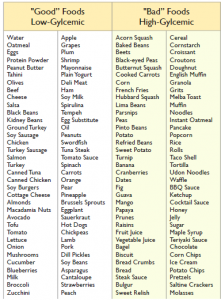Spinach and kale aren’t the only things to watch in your diet. Eating low glycemic foods may slow the development and progression of AMD. The glycemic index measures how quickly carbohydrates get glucose (sugar) into the blood stream. People with diabetes will find this familiar. High glycemic foods like potatoes, white rice, processed foods like cakes and crackers and cereal raise the blood glucose level. Low glycemic foods include vegetables and beans.

*Here are some tips from Harvard University for low-glycemic eating.
1. Eat a lot of non-starchy vegetables, beans, and fruits such as apples, pears, peaches, and berries. Even tropical fruits like bananas, mangoes, and papayas tend to have a lower glycemic index than typical desserts.
2. Eat grains in the least-processed state possible: “unbroken,” such as whole-kernel bread, brown rice, and whole barley, millet, and wheat berries; or traditionally processed, such as stone-ground bread, steel-cut oats, and natural granola or muesli breakfast cereals.
3. Limit white potatoes and refined-grain products, such as white breads and white pasta, to small side dishes.
4. Limit concentrated sweets – including high-calorie foods with a low glycemic index, such as ice cream – to occasional treats. Reduce fruit juice to no more than one-half cup a day. Completely eliminate sugar-sweetened drinks.
5. Eat a healthful type of protein, such as beans, fish, or skinless chicken, at most meals.
6. Choose foods with healthful fats, such as olive oil, nuts (almonds, walnuts, pecans), and avocados, but stick to moderate amounts. Limit saturated fats from dairy and other animal products. Completely eliminate partially hydrogenated fats (trans fats), which are in fast food and many packaged foods.
7. Have three meals and one or two snacks each day, and don’t skip breakfast.
8. Eat slowly and stop when full.
*Adapted from Ending the Food Fight, by David Ludwig with Suzanne Rostler (Houghton Mifflin, 2008)
 Judith Delgado
Judith Delgado
Executive Director
Macular Degeneration Partnership


